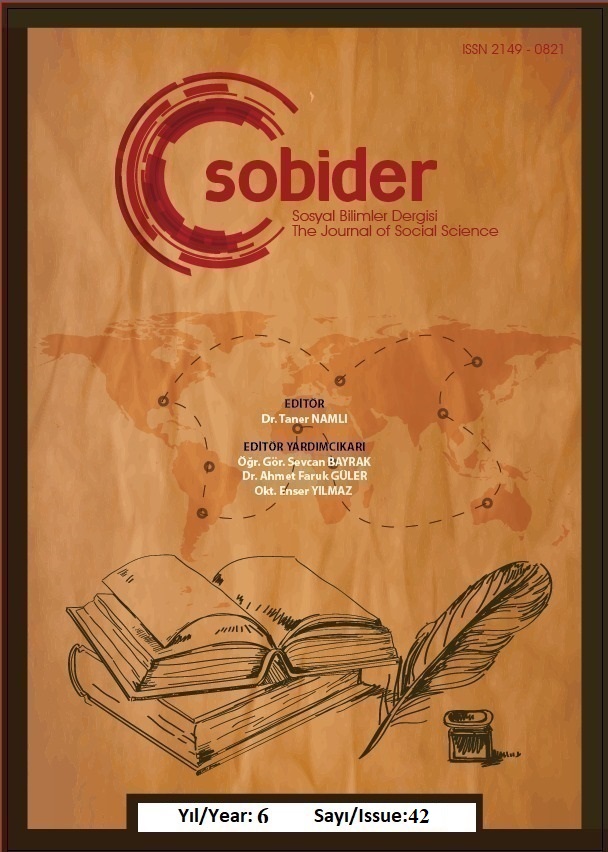BYRON’UN MUZAFFER ÖLÜM FİKRİNE KARŞIN SHELLEY’İN ÖZGECİL SEVGİ ANLAYIŞI: PROMETHEUS’DAN PROMETHEUS UNBOUND’A
Author :
Abstract
İkinci nesil Romantik şairlerden Byron ve Shelley coğrafi, kültürel, sosyal ve politik hiçbir sınırlamaya bakmaksızın şiirlerini devrimci bir ruhla güçlendirmişlerdir. Her iki şairin de idealize ettiği bu devrimci ruh, mitolojinin direniş sembollerinden Prometheus’un çeşitli edebi türlerde, birbirini dışlayan iki farklı kompozisyonuna zemin hazırlamıştır. Byron’un Prometheus şiirinde temsil ettiği Prometheus, onun görgül temelli dünya anlayışına ve göndergesel dil kullanımına bağlı olarak Byronvari kahraman imgesinde şekillenmiş olup muzaffer ölüm mefhumunun sembolü haline gelmiştir. Öte yandan, Shelley’in Prometheus Unbound adlı lirik dramasında görgül aşkınlık anlayışıyla ve çağrışımcı bir dil kullanımıyla azat edilen Prometheus, zihni ve evreni yeniden şekillendirecek sonsuz bir tutkuyu besleyen özgecil sevginin sembolü olarak temsil edilmiştir. Bu çalışma, Shelley’in özgecil sevgi anlayışıyla yarattığı Prometheus’un, Byron’un muzaffer ölüm fikrini ihtiva eden Prometheus’unu ne şekilde aşkınlığa taşıdığını incelemeye çalışacaktır.
Keywords
Abstract
Byron and Shelley, among the second generation Romantics, empowered their poetry by unleashing a revolutionary spirit regardless of any geographical, cultural, social and political limitation. This revolutionary spirit idealized by the two Romantics gave birth to two mutually exclusive compositions of the mythical insurgent Prometheus in variant literary forms. Shaped by his empirically-grounded understanding of the world and his referential use of language, Byron’s Prometheus is portrayed in his poem Prometheus in the image of a Byronic hero, turning into a symbol for his conception of victorious death. Shelley’s Prometheus emancipated through an empirical transcendence and evocative language in his lyrical drama Prometheus Unbound, on the other hand, is represented as a symbol of selfless love fostering the never-extinguishing passion for reforming the mind and the world. Accordingly, this study intends to explore how Shelley’s Prometheus, empowered with his understanding of ‘selfless love’, transcends Byron’s Prometheus embodying the Byronic idea of ‘victorious death’.
Keywords
- ed. vol 2. W.W. Norton & Company, 1993.
- Beatty, Bernard. “Byron and the Eighteenth Century.” The Cambridge Companion to Byron, edited by Drummond Bone. Cambridge UP, 2004.
- Beaty, Frederick L. “Byron’s Concept of Ideal Love”. Keats-Shelley Journal, vol. 12, 1963, pp. 37-54.
- Byron, Lord. “Prometheus.” The Complete Poetical Works of Lord Byron, edited by Jerome J. McGann, 5 vols. Clarendon, 1980.
- Century British Culture, edited by Frank Palmeri. Ashgate Publishing, 2006.
- Cochran, Peter. “Byron’s European reception.” The Cambridge Companion to Byron, edited by Drummond Bone. Cambridge Up, 2006, pp. 249-264.
- ---. “Byron and Shelley: Radical Incompatibles.” Romanticism on the Net. Issue 43, 2006.
- Cooper, Andrew M. “Chains, Pains, and Tentative Gains: The Byronic Prometheus in the Summer of 1816.” Studies in Romanticism, vol. 27, no. 4. Beginning Byron’s Third Century, 1988, pp. 529-550.
- Shelley, edited by Timothy Morton. Cambridge Up, 2007, pp. 65-84.
- Curran, Stuart. “The Political Prometheus.” Studies in Romanticism, vol. 25, no. 3, Homage to Carl Woodring, 1986, pp. 429-455.
- Dennis, Ian. “Making Death a Victory”: Victimhood and Power in Byron’s “Prometheus” and the “Prisoner of Chillon.” Keats-Shelley Journal, 2001, pp. 144-150.
- Duffy, Cian. “‘The Child of a Fierce Hour’: Shelley and Napoleon Bonaparte.” Studies in Romanticism, vol. 43, no. 3, 2004, pp. 399-416.
- Isomaki, Richard. “Love as Cause in Prometheus Unbound.” Studies in English Literature, 1500-1900, vol. 29, no. 4, Nineteenth Century, 1989, pp. 655-673.
- Keach, William. “The Political Poet.” The Cambridge Companion to Shelley, edited by Timothy Morton. Cambridge UP, 2006.
- Miller, Christopher R. “Pastures New and Old: The Romantic Afterlife of Pastoral Elegy.” A Companion to Romantic Poetry, edited by Charles Mahoney. Wiley-Blackwell, 2011.
- Quinney, Laura. “Romanticism, Gnosticism, and Neoplatonism.” A Companion to Romantic Poetry, edited by Charles Mahoney. Wiley-Blackwell, 2011.
- Raben, Joseph. “Shelley’s ‘Prometheus Unbound’: Why the Indian Caucasus?” Keats-Shelley Journal, vol. 12, 1963, pp. 95-106.
- Robinson, Charles E. The Snake and Eagle Wreathed in Fight. Johns Hopkins UP, 1976.
- Shelley, Percy Bysshe. “A Defence of Poetry.” Critical Theory Since Plato, edited by Hazard Adams and Leroy Searle. Wadsworth Publishing, 2004.
- ---. “Prometheus Unbound.” The Norton Anthology of English Literature, edited by M.H. Abrams. 6 ed. vol 2. W.W. Norton & Company, 1993.
- Urgan, Mina. İngiliz Edebiyat Tarihi. Yapı Kredi Yayınları, 2011.





